Originally posted by Global Voices at http://globalvoicesonline.org/2012/01/19/brazil-carnival-public-space-occupy/
Written by Thiana Biondo
On 14 January a protest against the privatization of public spaces took place in anticipation of the Carnival of Salvador, one of the biggest street parties in the world, which will start on 18 February. The demonstration was a clear message to the Mayor of the City of Salvador, in the federal state of Bahia, João Henrique, and the company Premium to withdraw one of the provisional private balcony developments used during Carnival. Known as ‘camarote' in the country, these structures seize a large area of public space in the main avenue of Ondina region, where the protest took place.
According to Blog da Ilha (Blof of the Island) [pt], even though the area belongs to the Federal government, the City Hall has given permission to the private company Premium to use it for building one ‘camarote' infrastructure, the ‘Camarote Salvador'. The Federal Assets Department (SPU, in Portuguese) has fined Premium R$ 374 thousand (U$ 210 thousand), but the ‘Camarote Salvador' is still expected to be built. Blog da Ilha also reported that each person will pay from R$ 490,00 (U$ 272) to R$ 990,00 (U$550) to have one-day access to the ‘Camarote Salvador' or up to R$ 4.890,00 (U$ 2.720) for unlimited access during Carnival.
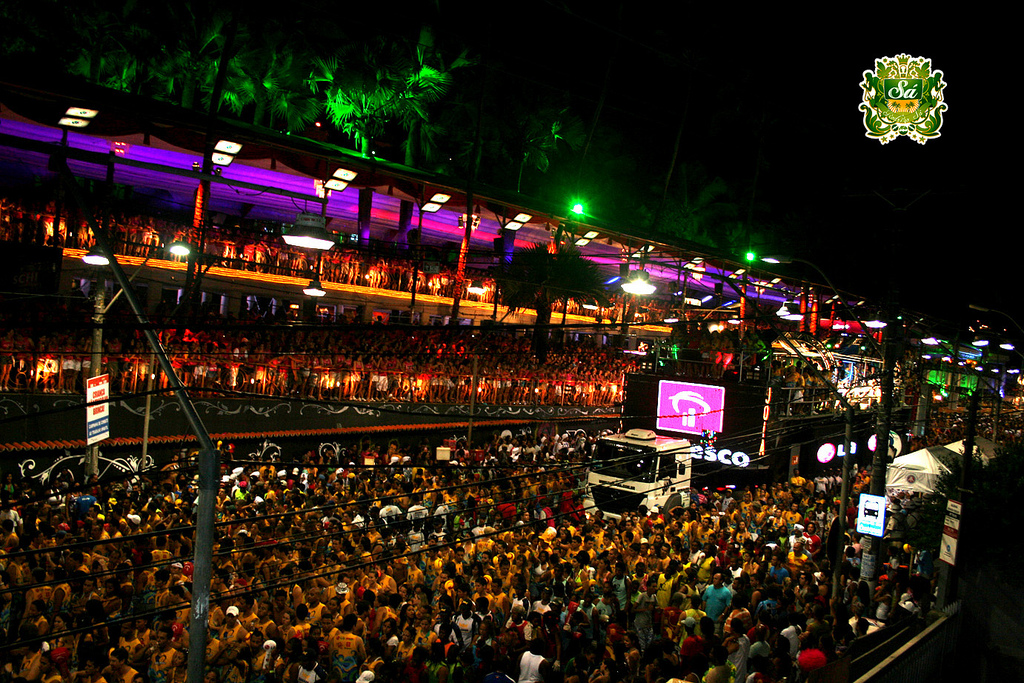
People who want to enjoy the street Carnival of Salvador without paying get squeezed by camarotes on one side and paid "carnival blocks" on the other. Photo from the Ondina area, Carnival 2010, by Rodrigo Sá on Flickr (CC BY 2.0)
The spread of ‘camarote' structures along pavements is not alone as an issue. The growth of the business of Carnival ‘blocos' (blocks) also restricts the right of one to enjoy the party for free in the street. Paid Carnival ‘blocos' set up band groups to play on the top of trio elétricos (trucks with sound system) and sell a kind of uniform (abadá) to the public. To separate consumers from non-consumers, they put security guards holding a cord around trio elétricos and those who paid for the uniform. When the band play along the street, non-payers got squeezed by both ‘camarotes' and private ‘blocos'.
Carnival for all
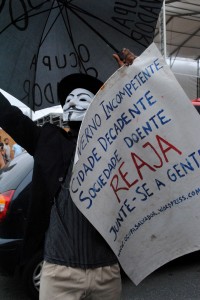
"Incompetent government, decadent society. React. Join us." Photo by Clarissa Pacheco on Flickr (CC BY 2.0)
The movement has started on the Internet. Groups have been set up on Twitter (@OcupaSalvador) and Facebook (Ocupa Salvador) aiming to claim the public space for people to play Carnival freely, demonstrating that the movement has received some influence from Occupy Movements across the world.
Though the judge of the 7th Instance of the Treasury Court, Lisbete Maria, had issued a provisional injunction that would forbid the protest on the site, people came into the street on the 14th of January. Social media have been used to keep the movement alive so that people from Salvador can claim the right to make their Carnival less concerned with profit and more focused on people.
Former Dean for the Federal University of Bahia Naomar Almeida Filho (@naomar_almeida) posted a series of pictures and messages [pt] on Twitter, which illustrate what he called a ‘manifestation against the closure of Ondina park which has been rented for a private balcony':
DESOCUPA foi um flash-mob convocado por redes sociais. Levou 1000 pessoas numa tarde chuvosa a Ondina. A imprensa noticiou timidamente
‘DESOCUPA' was a flash-mob called by social media. It took 1000 people to Ondina area in a rainy afternoon. The press timidly reported it.
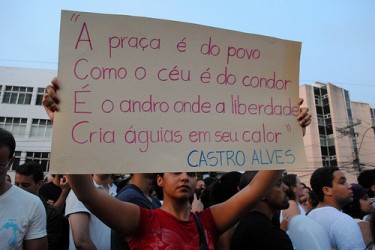
"The square belongs to the people / as the sky is for the condor / it is the sight where freedom / creates eagles in its warmth" Castro Alves. Photo by Clarissa Pacheco on Flickr (CC BY 2.0)
André Lemos (@andrelemos), an Associate Professor at the Federal University of Bahia and expert in cyberculture, tweeted [pt]:
Carro, desocupa a calçada; camarote, desocupa a praia; som alto, desocupa o ambiente; violência, desocupa os espíritos - #desocupa salvador.
Car, withdraw from the pavement; private balcony, withdraw from the beach; loud music, withdraw from the environment; violence, withdraw from the souls - #desocupa salvador
On Youtube, a video shows people of all ages voicing their opinion in a communal microphone and crying out the word “Desocupa” (Withdraw):
Integration despite any difference
In the past, the Carnival of Salvador was a more inclusive and democratic party, a moment of mixing of people from different social and cultural backgrounds in the same public space. However, in the last two decades, the scenario has changed with the presence of ‘camarotes' and paid Carnival ‘blocks'.
Besides profit, the privatization of the Carnival of Salvador sometimes uses another strong argument: security.
According to data published by the Confederation of National Municipalities (CNN, in Portuguese), the city of Salvador was the capital with the highest rate of gun-related-deaths in Brazil during 1998 and 2008, reported Rádio Metrópole website [pt].
During Carnival the spread of ‘camarotes' along the streets reduces the free space available, increasing the distance between rich and poor, creating even more hostility between classes. Wikitravel does not gloss over it in the section Stay Safe : “Due to high social inequality, Salvador is notorious for street crime”.
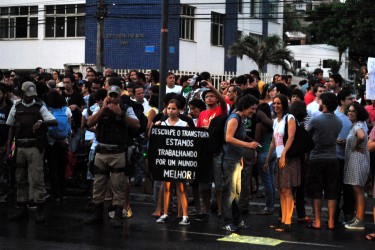
"My apologies for the inconvenience, we are working for a better world!" Photo Clarissa Pacheco on Flickr (CC BY 2.0)
On Facebook, user Ernesto Diniz looks at when Carnival was in fact a time that social integration used to happen [pt]:
Com a cara-de-pau de um turismo excludente e industrializado, a cidade, ano a ano, é loteada e paralisada para que o Carnaval possa passar. A festa foi descaracterizada há muito e pouco sobrou do Carnaval que celebra a suspensão de todas as diferenças.
Because of a no-shame kind of tourism which is exclusionary and industrialized, the city, year by year, is looted and paralyzed in order to allow the Carnival to pass through. The party has already lost its peculiar characteristics since a long time ago and not much has been left of a Carnival which used to celebrate [people] integration despite any difference.
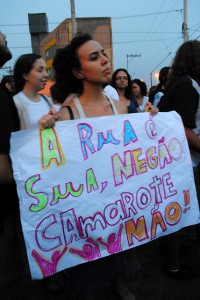
In Salvador, the popular carnival will change places soon.
ReplyDelete